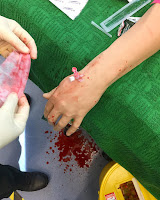BSc Paramedic Science - Frequently Asked Questions 2018/19 - Part 1
Here are some of the most frequently asked questions that I received in the academic year 2018/19. I am so lucky to have such an interested and enthusiastic Instagram follower base, so this is where these questions come from as it is the best way to get hold of me! If you have any questions, please always feel free to send me a message! What year are you in and where do you study? Originally I was going to keep this on the down-low, however as every university is different it is probably quite helpful to let you guys know. I study at Anglia Ruskin University and I am now in Year 3, although these questions were asked when I was in Year 2! How do your ambulance placements work? Do you get paid? With the university route, you do not get paid unless you do a sandwich (placement) year, and I am not sure if any universities do that anymore (I know University of Hertfordshire used to but does not anymore). As you may not have your blue-light driving qualification and you are not employ...

